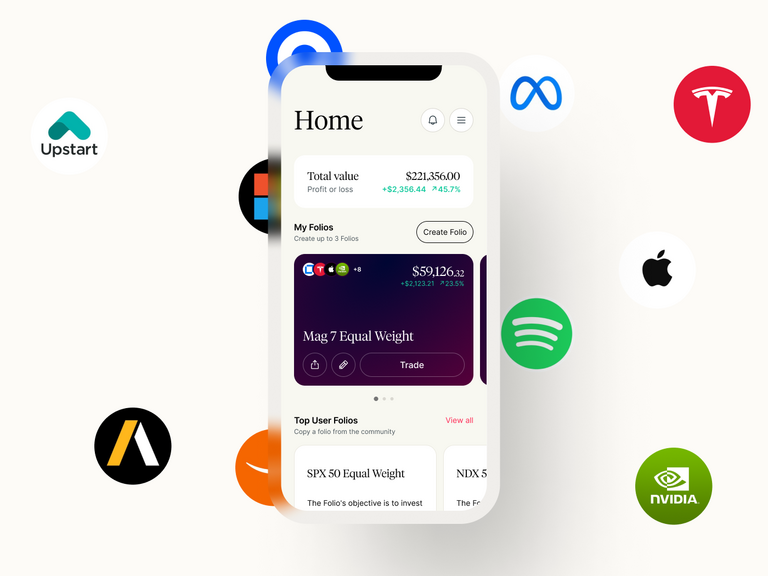Is it time to diversify beyond the ‘magnificent seven’?
Analysts at Citi Research have recommended that investors adopt a barbell approach, in order to mitigate the oversaturation of these seven mega-cap stocks.
They suggested a list of mid-cap technology stocks that could add balance to investors’ portfolios.
Many of these are software-as-a-service (SaaS) stocks. Here, OPTO highlights five top picks.
Citi’s Screener
While not suggesting that investors should ditch the magnificent seven, Citi Research advocated balancing the mega-caps with smaller technology stocks in a barbell approach.
To this end, Citi’s team screened for buy-rated, mid-cap stocks with traditional and non-traditional technology exposure, at least 15% expected total return, and positive expected EPS for 2024.
A significant number of the results were SaaS companies, though between them they provide exposure to various other themes including artificial intelligence (AI), fintech, cloud computing and cyber security.
We have picked out five of the SaaS stocks with the highest-expected returns for a closer examination.
Five SaaS Stocks: Fundamentals
| P/S Ratio | Forward P/S Ratio | P/E Ratio | Forward P/E Ratio | Expected Return |
ESTC | 5.71 | 4.93 | 129.83 | 47.11 | 79.3% |
DOCU | 4.06 | 3.74 | 12.00 | 16.11 | 52.8% |
ZS | 11.63 | 9.51 | N/A | 58.31 | 47.9% |
U | 3.79 | 4.20 | N/A | 29.99 | 40.4% |
MDB | 11.18 | 9.71 | N/A | 108.00 | 38% |
Source: Stockanalysis.com
Elastic
With an expected return of 79.3%, this would be the highest-returning stock on Citi’s list if all meet their expectations.
Elastic [ESTC] — formerly known as Elasticsearch — is a Dutch-American company that builds a distributed search and analytics engine; in other words, it enables companies to search and analyze large amounts of information very quickly. This includes reviewing activity logs to spot problems, searching through large blocks of text or data, and monitoring system performance.
Analysts expect Elastic’s annual EPS to increase 80.67% from $1.19 to $2.15 between 2023 and 2026, while sales are expected to increase 49.61% over the same period. Its currency valuation relative to its trailing and projected sales is also reasonable for a high-growth SaaS stock.
Docusign
Based on its fundamentals, Docusign [DOCU] is one of the most attractively priced SaaS stocks on Citi’s list, particularly if it achieves the 52.8% return that Citi analysts have forecast.
Docusign marked the general release of its Intelligent Agreement Management (IAM) system, a suite of AI-powered cloud software tools for streamlining and automating agreement processes, during its Q2 2025. If successful, the IAM could underpin the 46.01% revenue growth that analysts forecast between 2023 and 2027.
ZScaler
Zscaler [ZS] is a cloud-based cybersecurity company. It has a particular focus on zero-trust, and optimizes its security software for cloud-first businesses; in that regard, it can be considered a SaaS company for SaaS companies.
Zscaler’s stock has fallen 23.94% in the year to date, but is 8.92% up over the last 12 months.
Analysts expect Zscaler’s revenue to grow 110.60% between its FY 2024 and 2028. One driver could be the integration of AI into its products; on September 17, Zscaler announced a set of AI and zero-trust integrations between its Zero Trust Exchange and Data Fabric for Security platforms with fellow cyber security company CrowdStrike’s [CRWD] Falcon platform.
Analysts project a 47.9% return for the stock.
Unity
Unity [U] is a games development platform available to developers via the cloud.
Unity’s share price gained 9.81% on September 12 as Reuters reported that it had abandoned its “runtime fee” policy in favor of its pre-existing seat-based pricing plan, which is more customary for SaaS stocks. The step-down ends a long-running saga that had seen customers vow to boycott Unity over the fees, which increased if games were more successful, and forced the resignation of former CEO John Riccitiello.
Unity also hiked the price of both its paid tiers, Unity Pro and Unity Enterprise, by 8% and 25% respectively.
Despite the recovery since, Unity’s share price is down 50.55% year to date. If Citi’s return projections are accurate, now could be a good time to buy the dip in Unity’s stock, especially as it is the cheapest among these five relative to its trailing sales.
MongoDB
In terms of categorization within the SaaS ecosystem, MongoDB [MDB] defines its primary product, its Atlas database, as platform-as-a-service, but specific tools within its product suite — such as Atlas Charts — are SaaS.
MongoDB is expected to return 38%. It stands out as one of the priciest stocks in this list of five, both in terms of sales, projected sales and projected earnings. Like Unity and ZScaler, it has not posted a profit, in GAAP terms, over the past 12 months either. All of that combined makes this one of the riskier plays among this selection.
However, investors willing to take this risk could see rewards in the long term. Its revenue is expected to increase from $1.68bn in 2023 to $3.10bn in 2027, representing a CAGR of 16.55% during that period.
However, MongoDB is one of the five most popular database management systems worldwide, according to Statista. With Oracle [ORCL] and Microsoft [MSFT] owning three of the top four between them, and the final top five constituent, PostgreSQL, being an open-source project, MongoDB is arguably the best mid-cap option for exposure to the database market.
Conclusion
While Citi analysts have highlighted the advantages of including stocks like these alongside tech megacaps as part of a barbell strategy, it is important to remember that all investing, particularly in growth technology stocks, involves risk.
Investors should consider the risk as well as the reward, and conduct thorough research before reaching an investment decision.
Disclaimer Past performance is not a reliable indicator of future results.
CMC Markets is an execution-only service provider. The material (whether or not it states any opinions) is for general information purposes only, and does not take into account your personal circumstances or objectives. Nothing in this material is (or should be considered to be) financial, investment or other advice on which reliance should be placed. No opinion given in the material constitutes a recommendation by CMC Markets or the author that any particular investment, security, transaction or investment strategy is suitable for any specific person.
The material has not been prepared in accordance with legal requirements designed to promote the independence of investment research. Although we are not specifically prevented from dealing before providing this material, we do not seek to take advantage of the material prior to its dissemination.
CMC Markets does not endorse or offer opinion on the trading strategies used by the author. Their trading strategies do not guarantee any return and CMC Markets shall not be held responsible for any loss that you may incur, either directly or indirectly, arising from any investment based on any information contained herein.
*Tax treatment depends on individual circumstances and can change or may differ in a jurisdiction other than the UK.
Continue reading for FREE
- Includes free newsletter updates, unsubscribe anytime. Privacy policy





